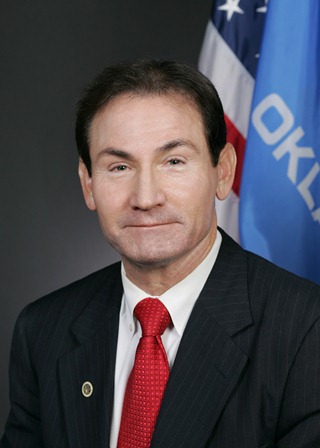In order to provide equal access and equal opportunity to people with diverse abilities, this site has been designed with accessibility in mind. Click here to view
Senate approves STEM legislation to help better prepare students for workforce
 Sen. Ron Sharp
Sen. Ron Sharp
The Senate gave unanimous approval to legislation Wednesday that would help better prepare students for jobs in the fields of science, technology, engineering and mathematics (STEM). Senate Bill 1181, by Sen. Ron Sharp, seeks to put into effect some of the recommendations made by the governor’s Science and Technology Council, a group focused on enhancing workforce development through the strengthening of STEM education programs at K-12 and college levels.
“In order for students to be successful, they not only need the support of their teachers but also their local communities,” said Sharp, R-Shawnee. “This is a program that will involve local businesses and other community leaders in helping improve the education of their students and provide them with the tools they need to get those jobs that are in high demand in the areas of science, technology, engineering and mathematics.”
SB 1181 creates a mechanism for establishing criteria and a process for designation as a STEM Community or Region. The STEM Community or STEM Region is one of several recommendations made in the governor’s Science and Technology Council “OneOklahoma” report.
In order to be designated as a STEM Community or Region, educators, administrators, business leaders, students, parents, government officials and business and industry groups within a community or region would be required to create awareness, promote partnerships with education and industry, develop and execute action plans for improving STEM education and training, identify and acquire the needed resources to improve STEM education and training. These entities would also need to identify and accumulate STEM data within the community or region, including but not limited to kindergarten through 12th grade test results, the number of STEM-related degree holders in the local workforce, the number of STEM-related degrees conferred and the number of STEM-related certifications or credentials obtained.
Sharp noted that the concept of creating a STEM Community or Region is incorporated in the Department of Education’s STEM strategy and will include and support STEM programs in many of the Department of Career and Technology Education’s technology centers.
State legislators would initiate the designation of STEM Communities or Regions through an application process but the final approval and designation would reside with the governor.
The application process would be outlined by a subcommittee of an existing STEM education or workforce committee or board, to be identified by the governor. The Coalition for the Advancement of Science and Mathematics Education in Oklahoma (CASMEO) would be responsible for the creation, sustainment and execution of that subcommittee, which would be tasked with establishing the criteria for the application process. The subcommittee would also study issues related to the promotion and growth of STEM education and training in the state and make recommendations to address the current and pending shortage of highly skilled employees in the energy, agriculture and biosciences, aerospace and defense, transportation and distribution, information technology and financial services sectors in Oklahoma.
SB 1181 was crafted with the help of Marty Lewis, Administrator of Gordon Cooper Vo-Tech; Dr. Robert Sommers, State Chair of the Board of Career and Technology Education; Dr. Terry Underwood, Administrator of the Eastern Oklahoma County Vo-Tech; and Dr. Stephen McKeever, Cabinet Secretary of Science and Technology.
“I want to thank Governor Fallin, the Science and Technology Council, Marty Lewis, Dr. Robert Sommers, Dr. Terry Underwood and Dr. Stephen McKeever for their help in drafting this important piece of legislation. Their knowledge and expertise was key in creating a program that will ensure our students are highly-skilled and able to compete and get jobs in these high demand fields in our 21st Century global economy.”
 Oklahoma Senate
Oklahoma Senate

